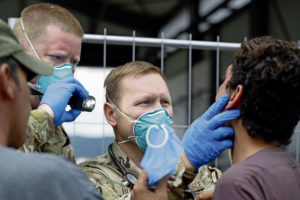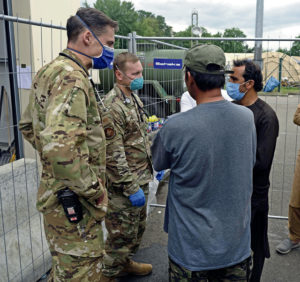
The medical Pods at the temporary Joint Mobility Processing Center at Ramstein Air Base are just the first stop for medical care for newly arrived evacuees during Operation Allies Refuge.
Here, and throughout their stay on the installation, Air Force medical teams make sure evacuees rapidly get the care they need: whether receiving much needed over-the-counter medicine, being seen by an OB-GYN or getting treated for other illnesses.
With the JMPC quickly reaching capacity during OAR, many evacuees ended up being medically treated before they were processed through the center.
“We had almost 7,000 people at one time here in the holding areas that had not been to the medical triage or gone through processing,” said Lt. Col. Simon Ritchie, 86th Medical Group field response team chief. “That’s where the secondary mission of my team became, ‘Okay well they’re not coming to us so we need to go to them.’”
Ritchie’s team began to periodically visit the holding areas to treat evacuees. Many of the evacuees were treated for injuries or illnesses related to their difficult journeys , such as diarrhea, dehydration and exhaustion.
“We (also) have a lot of people who are diabetics, who have high blood pressure, auto-immune disease and thyroid disease, but they don’t have their medicine or lost their medicine,” Ritchie said. “So we’re trying to replenish with at least (enough) supply to get them to their next location.”
Evacuees with more serious injuries were treated at the Landstuhl Regional Medical Center. Some expecting mothers were treated at the LRMC as well.
“I would say one out of four women is a woman with a child,” Ritchie said. “We’re seeing massive families come through here, with 28 people, (that) kind of thing.”

Transport to the LRMC proved too long for some expecting mothers, with 3 babies being born on Ramstein as of this writing, and 17 total between the two locations. A pod was specifically created to attend to pregnant mothers.
“We’ve had two babies delivered here in this (pod),” said Capt. Danielle Holland, 48th Surgical Operations Squadron OB-GYN.
As a trained obstetrician, Holland has brought new children into the world but Operation Allies Refuge was an experience unlike any she’d had before.
“I never expected I would be delivering babies in (pods),” Holland said. “We (also) needed to come up with different ways to do exams without the tools we normally have at home.”
To add to the difference in tool availability, communication barriers proved to be difficult for Holland and her team to navigate around.
“They have so many different dialects and that’s challenging in and of itself, but it’s also particularly challenging to be talking about female problems,” Holland said. “Some of the translators I’ve worked with said, ‘I don’t even know these words because we don’t really learn them.’”
Evacuees have been grateful to Holland nonetheless, with one mentioning that it was the smoothest newborn experience she had ever had.
“This was her 9th baby,” Holland recalled. “(It) made me happy and sad at the same time that delivering in the (pod) was the best delivery experience she can think of because she said she’s never had anyone treat her so well during labor.”
Saving lives and helping new ones is where medical is positioned to perform at the end of the day, and the Airmen at the medical tents are seeing the results firsthand.
“We do a lot of admin work so you don’t get these situations thrown at you with all the unknowns where you have to improvise and overcome the challenges,” Ritchie said. “It’s a really good opportunity.”


